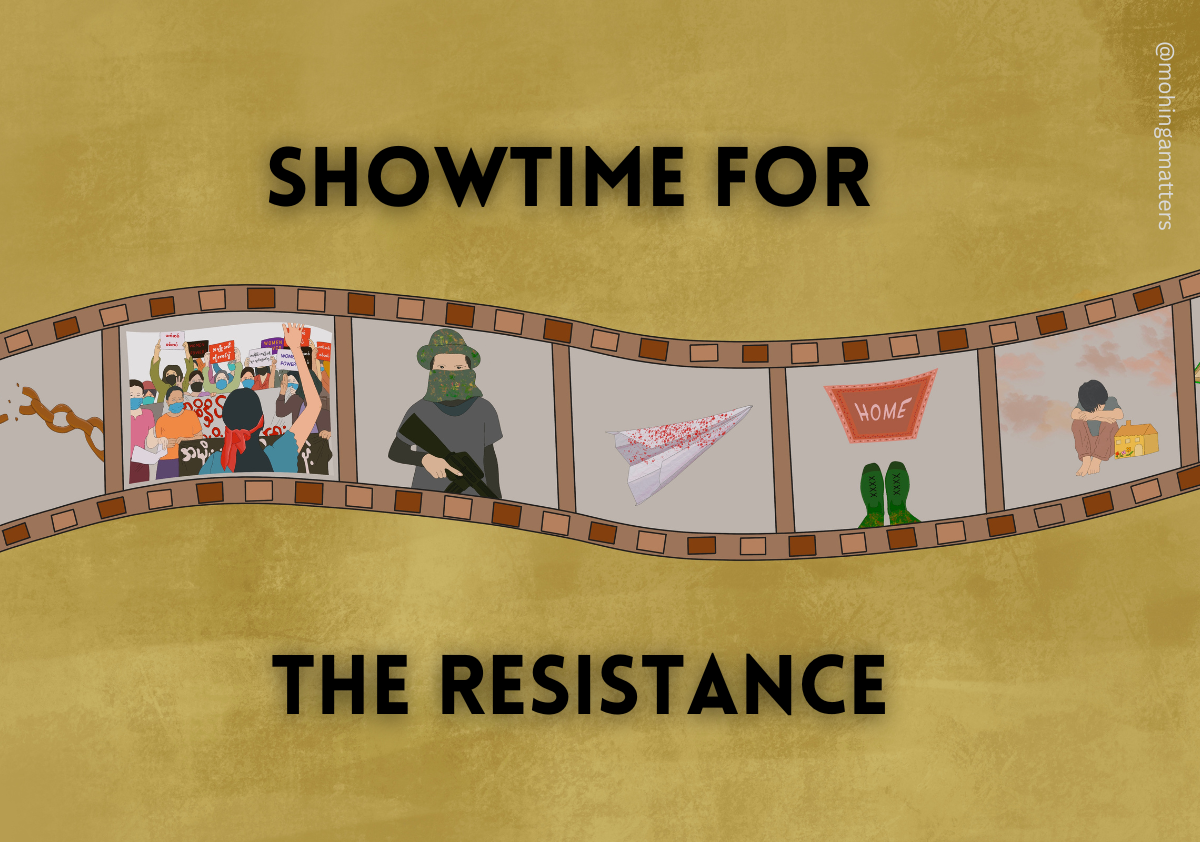
Amid the cold mid-autumn weather of October in London, Burmese people made a long line waiting for the screening of the revolutionary film. The film was called “The Road Not Taken”, directed by Ko Pauk. London had the first show and the organizers were excited for the show which turned out to be a very successful opening.
The film then traveled around the world to Burmese diaspora communities, making trips to Australia, New Zealand, Japan, South Korea, Switzerland, Jamaica, the United States, Canada, Germany, Italy, France,Sweden, Norway, Malaysia, Taiwan, India and Singapore. It was screened with subtitles in each national language for non-Burmese audiences who support the Myanmar democracy movement as well. The film tickets were sold out within a few days. All the screening halls in each country were full. Some even had to add extra screening dates and extend to other cities of the same country. Though previously ‘Sa-Mhat (Starting Point)’ was the first ever short revolutionary film to raise funds by selling the movie tickets and screening through the telegram channels, this film of Ko Pauk was the first of its own kind to make it to screens physically to raise funds needed to sustain the people’s resistance movement against military rule.
Burmese people have no shortage of creative ideas to raise funds for the revolution as no other outside support has been received substantially. And this time– it is a film.
The Road Not Taken is based on a true story about a defector from the Myanmar military and his journey to a liberated area under control of the Ethnic-Armed Organization (EAO). The film took the audience back to the beginning months of the coup in 2021 where crowds came out to the streets to demand a return to democracy. People begged the security forces, police and soldiers alike, to join the side of the people, however, they started to shoot unarmed demonstrators. The order from the above to shoot unarmed civilians put some kind-hearted soldiers and police in a dilemma. The main actor of this film was one of the sensible and kind-hearted ones who refused to shoot and decided to leave the army despite the risks. He defected from the army when he was posted on the front line. Away from him, his wife and daughter suffered from the social punishment of the community as the husband was a soldier killing innocent civilians. The film was well-received and many praised the director for having made a film with very limited resources in an EAO-controlled liberated area, where it frequently faces arm clashes between the Karen National Liberation Army (KNLA) and the regime’s forces. In fact, only an iphone was used to shoot the entire film. After the show, director Ko Pauk performed a live unplugged music for the audience and exchanged words of determination to continue fighting against the military.
Myanmar communities abroad are organizing various events to raise funds to support the People Defense Forces (PDF) fighting against the junta soldiers, and also to provide humanitarian aid to the displaced communities in the conflict areas. At such events, the organizers do not just screen films. They also sell handicrafts and Burmese food to raise much-needed funds, but sometimes they request for donations at the event sites. At some events, there were even auctions of jewelry and some treasured items.
From the screening of Ko Pauk’s “The Road Not Taken” in more than 20 countries, about MMK 4600 Lakh (approximately USD 220,000) was raised. This was sent to support the PDFs and urban guerillas as well as people who had contributed to the success of the film in the liberated area where the director currently lives. Many revolutionary films, documentaries and animated short-films have mushroomed by talented artists and directors in exile or even those inside the country but hiding in safe houses. The most internationally-acclaimed and award-winning film is “Myanmar Diaries”, filmed by a group of anonymous young Burmese filmmakers and supported by European film professionals, which has been shown in different film festivals in Europe.
Amidst the ongoing revolution, many amateur filmmakers, both in exile and in the liberated areas, have emerged to create what they experience and what they feel in regards to the fight for democracy. From 2022-2023, more than a dozen short-films related to the revolution have been produced, and they tell the stories about urban guerrillas, tortures inside the prison, the loss of homes to the regime’s scorched-earth tactic, women freedom fighters, and young PDF fighters. Myanmar people are determined to win this fight, and millions of funds are needed to support the PDF and to provide humanitarian assistance to people who have lost everything in the revolution. Among many strategies and ideas to raise funds, films truly are an act of creative resistance.

